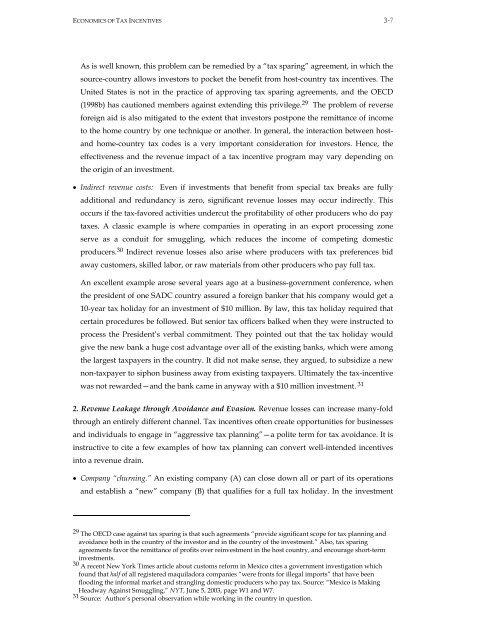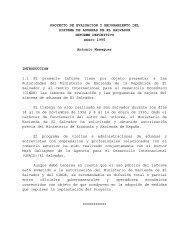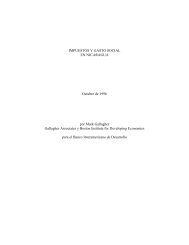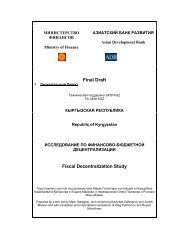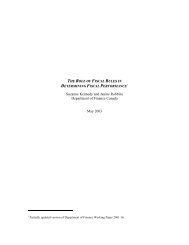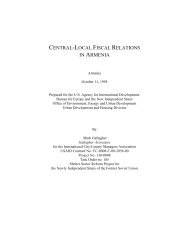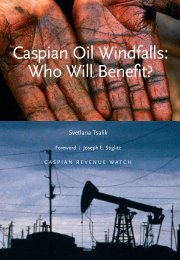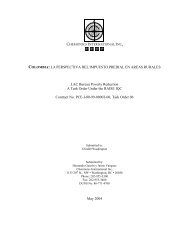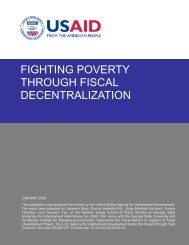Effectiveness and Economic Impact of Tax Incentives in the SADC ...
Effectiveness and Economic Impact of Tax Incentives in the SADC ...
Effectiveness and Economic Impact of Tax Incentives in the SADC ...
Create successful ePaper yourself
Turn your PDF publications into a flip-book with our unique Google optimized e-Paper software.
ECONOMICS OF TAX INCENTIVES 3-7<br />
•<br />
•<br />
As is well known, this problem can be remedied by a “tax spar<strong>in</strong>g” agreement, <strong>in</strong> which <strong>the</strong><br />
source-country allows <strong>in</strong>vestors to pocket <strong>the</strong> benefit from host-country tax <strong>in</strong>centives. The<br />
United States is not <strong>in</strong> <strong>the</strong> practice <strong>of</strong> approv<strong>in</strong>g tax spar<strong>in</strong>g agreements, <strong>and</strong> <strong>the</strong> OECD<br />
(1998b) has cautioned members aga<strong>in</strong>st extend<strong>in</strong>g this privilege. 29 The problem <strong>of</strong> reverse<br />
foreign aid is also mitigated to <strong>the</strong> extent that <strong>in</strong>vestors postpone <strong>the</strong> remittance <strong>of</strong> <strong>in</strong>come<br />
to <strong>the</strong> home country by one technique or ano<strong>the</strong>r. In general, <strong>the</strong> <strong>in</strong>teraction between host-<br />
<strong>and</strong> home-country tax codes is a very important consideration for <strong>in</strong>vestors. Hence, <strong>the</strong><br />
effectiveness <strong>and</strong> <strong>the</strong> revenue impact <strong>of</strong> a tax <strong>in</strong>centive program may vary depend<strong>in</strong>g on<br />
<strong>the</strong> orig<strong>in</strong> <strong>of</strong> an <strong>in</strong>vestment.<br />
Indirect revenue costs: Even if <strong>in</strong>vestments that benefit from special tax breaks are fully<br />
additional <strong>and</strong> redundancy is zero, significant revenue losses may occur <strong>in</strong>directly. This<br />
occurs if <strong>the</strong> tax-favored activities undercut <strong>the</strong> pr<strong>of</strong>itability <strong>of</strong> o<strong>the</strong>r producers who do pay<br />
taxes. A classic example is where companies <strong>in</strong> operat<strong>in</strong>g <strong>in</strong> an export process<strong>in</strong>g zone<br />
serve as a conduit for smuggl<strong>in</strong>g, which reduces <strong>the</strong> <strong>in</strong>come <strong>of</strong> compet<strong>in</strong>g domestic<br />
producers. 30 Indirect revenue losses also arise where producers with tax preferences bid<br />
away customers, skilled labor, or raw materials from o<strong>the</strong>r producers who pay full tax.<br />
An excellent example arose several years ago at a bus<strong>in</strong>ess-government conference, when<br />
<strong>the</strong> president <strong>of</strong> one <strong>SADC</strong> country assured a foreign banker that his company would get a<br />
10-year tax holiday for an <strong>in</strong>vestment <strong>of</strong> $10 million. By law, this tax holiday required that<br />
certa<strong>in</strong> procedures be followed. But senior tax <strong>of</strong>ficers balked when <strong>the</strong>y were <strong>in</strong>structed to<br />
process <strong>the</strong> President’s verbal commitment. They po<strong>in</strong>ted out that <strong>the</strong> tax holiday would<br />
give <strong>the</strong> new bank a huge cost advantage over all <strong>of</strong> <strong>the</strong> exist<strong>in</strong>g banks, which were among<br />
<strong>the</strong> largest taxpayers <strong>in</strong> <strong>the</strong> country. It did not make sense, <strong>the</strong>y argued, to subsidize a new<br />
non-taxpayer to siphon bus<strong>in</strong>ess away from exist<strong>in</strong>g taxpayers. Ultimately <strong>the</strong> tax-<strong>in</strong>centive<br />
was not rewarded—<strong>and</strong> <strong>the</strong> bank came <strong>in</strong> anyway with a $10 million <strong>in</strong>vestment. 31<br />
2. Revenue Leakage through Avoidance <strong>and</strong> Evasion. Revenue losses can <strong>in</strong>crease many-fold<br />
through an entirely different channel. <strong>Tax</strong> <strong>in</strong>centives <strong>of</strong>ten create opportunities for bus<strong>in</strong>esses<br />
<strong>and</strong> <strong>in</strong>dividuals to engage <strong>in</strong> “aggressive tax plann<strong>in</strong>g”—a polite term for tax avoidance. It is<br />
<strong>in</strong>structive to cite a few examples <strong>of</strong> how tax plann<strong>in</strong>g can convert well-<strong>in</strong>tended <strong>in</strong>centives<br />
<strong>in</strong>to a revenue dra<strong>in</strong>.<br />
Company “churn<strong>in</strong>g.” An exist<strong>in</strong>g company (A) can close down all or part <strong>of</strong> its operations<br />
<strong>and</strong> establish a “new” company (B) that qualifies for a full tax holiday. In <strong>the</strong> <strong>in</strong>vestment<br />
29 The OECD case aga<strong>in</strong>st tax spar<strong>in</strong>g is that such agreements “provide significant scope for tax plann<strong>in</strong>g <strong>and</strong><br />
avoidance both <strong>in</strong> <strong>the</strong> country <strong>of</strong> <strong>the</strong> <strong>in</strong>vestor <strong>and</strong> <strong>in</strong> <strong>the</strong> country <strong>of</strong> <strong>the</strong> <strong>in</strong>vestment.” Also, tax spar<strong>in</strong>g<br />
agreements favor <strong>the</strong> remittance <strong>of</strong> pr<strong>of</strong>its over re<strong>in</strong>vestment <strong>in</strong> <strong>the</strong> host country, <strong>and</strong> encourage short-term<br />
<strong>in</strong>vestments.<br />
30 A recent New York Times article about customs reform <strong>in</strong> Mexico cites a government <strong>in</strong>vestigation which<br />
found that half <strong>of</strong> all registered maquiladora companies “were fronts for illegal imports” that have been<br />
flood<strong>in</strong>g <strong>the</strong> <strong>in</strong>formal market <strong>and</strong> strangl<strong>in</strong>g domestic producers who pay tax. Source: “Mexico is Mak<strong>in</strong>g<br />
Headway Aga<strong>in</strong>st Smuggl<strong>in</strong>g,” NYT, June 5, 2003, page W1 <strong>and</strong> W7.<br />
31 Source: Author’s personal observation while work<strong>in</strong>g <strong>in</strong> <strong>the</strong> country <strong>in</strong> question.


